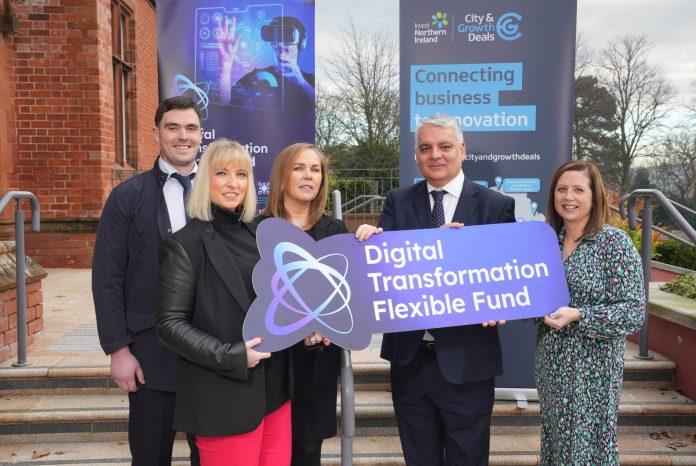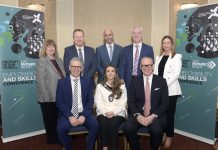
Small and micro businesses and social enterprises across the ABC borough are set to benefit from funding to help accelerate their digital transformation ambitions.
The Northern Ireland-wide Digital Transformation Flexible Fund (DTFF) was officially launched yesterday, Wednesday 29 November, at a special event in Riddel Hall at Queen’s University. The event highlighted how the scheme is set to stimulate digital innovation and remove the financial obstacles that prevent small and microbusinesses from implementing cutting-edge digital technology in order to transform their operations.
The £7.5m funding programme is unique in that it operates across all City and Growth Deals in Northern Ireland. Their shared ambition is to deliver digitally driven innovation, and this informs the suite of investment projects delivered through the Deals.
It is part funded by the NI Executive, UK Government, Department of Agriculture, Environment and Rural Affairs (DAERA) and all local authorities in Northern Ireland. The Fund will be delivered by all 11 Councils under the Full Fibre Northern Ireland Consortium (FFNI), which is led by Newry, Mourne and Down District Council and supported by Invest NI. This new delivery approach is an important step forward for Councils positioning their intent to drive their local economies, with an increasing focus on innovation support for businesses.
Lord Mayor of Armagh City, Banbridge and Craigavon Borough, Alderman Margaret Tinsley commented, “We welcome the launch of this new funding programme that will hopefully aid our local SME’s in their digital innovation endeavours. As the world around us is constantly moving forward in terms of digital advancements, it is crucial that the businesses in our borough get the support they need in order to be at the forefront of this transformation. I encourage businesses to find out more and register their expressions of interest through the website.”
Talking about how the DTFF programme will help to boost smaller businesses to compete with larger companies, Newry, Mourne and Down District Council Chairperson, Councillor Valerie Harte said, “It’s vital that smaller enterprises are not left behind and adapt to the rapid changes in customer behaviours, business models and keep up with the competition to continue to grow. DTFF is an exciting new initiative which will help them to overcome the barriers and challenges in developing their digital transformation plans.”
Mel Chittock, Interim CEO, Invest Northern Ireland said, “The Digital Transformation Flexible Fund will give businesses and social enterprises the opportunity to improve their resilience, develop new digital capability and to drive up levels of digital engagement and innovation. This in turn will help drive productivity and competitiveness, delivering tangible benefits for the business itself, and for Northern Ireland’s economy.”
The funding from DAERA will support rural businesses, Director of Rural Affairs Division, Teresa O’Neill said, “DAERA proudly invested £1.1m in the DTFF particularly to enable rural enterprises to access opportunities for innovation. This is underpinned by our priority to support sustainable, rural prosperity. We look forward to working with partners, helping make digital transformation possible for businesses across NI.”
Evidence demonstrates that smaller businesses do not have the capital resources available in terms of digital transformation and the adoption of digital technologies can lag relative to larger companies. Successful applicants can apply for a grant assistance between £5,000 and £20,000 ex VAT to fund their digital transformation project. If eligible, the grant can fund up to 70% of the cost with 30% match funding from the applicant. The Fund will be open to all business sectors that are VAT registered (with the exception of primary agriculture, forestry and fisheries), and have a 12-month minimum trading history.
The DTFF capital investments are committed to enabling business transformation rather than the ‘digitalisation’ of existing business models or operations and must be based on the following advanced digital technologies /tools:-
▪ Smart technologies/smart environments, the Internet of Things (IoT) and simulation;
▪ Process automation via robotics/cobotics, additive manufacturing;
▪ Big-data and analytics;
▪ Immersive Technologies (Augmented Reality/Virtual Reality/Mixed Reality/Haptics);
▪ Artificial intelligence and machine learning; and
▪ Horizontal & vertical system integration, distributed ledger systems/blockchain technologies.
For more details on programme eligibility and guidance or to register for a information session, please visit: www.dtff.co.uk







